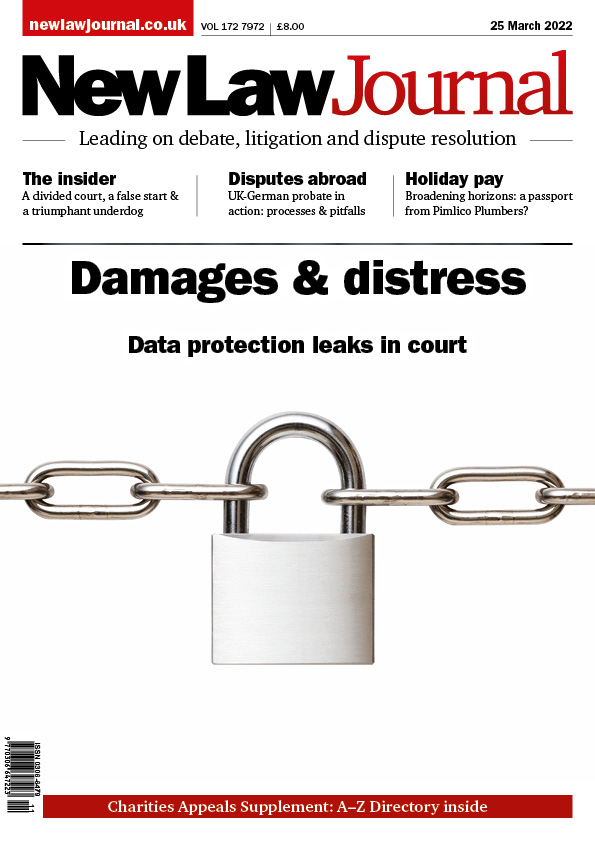THIS ISSUE

Casey Randall, Head of DNA at AlphaBiolabs, explores what you need to know about DNA testing for immigration
How does the court approach the issue of adult children who claim a will fails to provide for them? Myles McIntosh reports
Bernhard Schmeilzl runs through some typical problems & costly mistakes when dealing with probate cases involving the UK & Germany
Charles Pigott reports on a Court of Appeal ruling widening the scope for back-dated holiday pay claims
The UK courts have been exploring the limits of litigation brought by or on behalf of data subjects where there has been unlawful transmission or disclosure of personal data: Fergus McCombie of 36 Commercial surveys the state of play
Alec Samuels discusses how coroners' reports could help to prevent future deaths
Pimlico Plumbers smoothes the path to back-dated holiday claims
Judgments good, bad, ‘breathtaking’ & divided
NLJ's Charities Appeals Supplement has been published in this week's issue
MOVERS & SHAKERS

Jurit LLP—Caroline Williams
Private wealth and tax team welcomes cross-border specialist as consultant
.tmb-mov69x69.jpg?sfvrsn=961ae4db_1)
HFW—Simon Petch
Global shipping practice expands with experienced ship finance partner hire
95ca96e3d47f4eff8d147c4f0df17c77.tmb-mov69x69.png?sfvrsn=3db5d86b_1)
Freeths—Richard Lockhart
Infrastructure specialist joins as partner in Glasgow office
NEWS
Talk of a reserved ‘Welsh seat’ on the Supreme Court is misplaced. In NLJ this week, Professor Graham Zellick KC explains that the Constitutional Reform Act treats ‘England and Wales’ as one jurisdiction, with no statutory Welsh slot
The government’s plan to curb jury trials has sparked ‘jury furore’. Writing in NLJ this week, David Locke, partner at Hill Dickinson, says the rationale is ‘grossly inadequate’
A year after the $1.5bn Bybit heist, crypto fraud is booming—but so is recovery. Writing in NLJ this week, Neil Holloway, founder and CEO of M2 Recovery, warns that scams hit at least $14bn in 2025, fuelled by ‘pig butchering’ cons and AI deepfakes
After Woodcock confirmed no general duty to warn, debate turns to the criminal law. Writing in NLJ this week, Charles Davey of The Barrister Group urges revival of misprision or a modern equivalent
Family courts are tightening control of expert evidence. Writing in NLJ this week, Dr Chris Pamplin says there is ‘no automatic right’ to call experts; attendance must be ‘necessary in the interests of justice’ under FPR Pt 25






